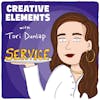
Bonnie Christine is an artist turned business owner with a team of 8.
Bonnie Christine has helped me step into the power and the idea of hiring, delegating, and buying back my time as an entrepreneur.
Bonnie has a team of 8 people now. She's done a fantastic job of putting herself in what she calls her zone of genius, And I wanted her to teach me about that, and by proxy, teach you about that as well.
Now Bonnie says she's a mom, an artist, and a fabric designer living in the hills of the Great Smoky Mountains.
In this episode, you’ll learn:
- How to calculate your freedom figure
- When to delegate
- How to delegate
- And how to create standard operating procedures (SOPs)
Full transcript and show notes
Get Bonnie's free resource here
Bonnie's Website / Facebook / Instagram
***
CONNECT
📫 Get my Professional Creator Crash Course (free)
🧰 Get my full gear list (free)
🙏 Make a guest or mailbag request
📝 Check out our curated Playlists
***
SPONSORS
💼 View all sponsors and offers
***
SAY THANKS
💜 Leave a review on Apple Podcasts
Learn more about your ad choices. Visit megaphone.fm/adchoices
Bonnie Christine [00:00:00]:
Trust this process because once you start taking off the, like, lower dollar tasks that you are personally still doing, you will be freed up to do higher and higher dollar tasks in your business, and it just simply works.
Jay Clouse [00:00:30]:
Hello, my friend. Welcome back to another episode of Creator Today's episode really goes back to June of this year. In June, I went to ConvertKit's Craft and Commerce Conference for the first time, And there were 2 talks at this year's conference that really made an impression on me at the time. The first was Amy Porterfield who will be on the show soon, And the 2nd was Bonnie Christine. Bonnie is today's guest, and what really stuck out to me about Bonnie's talk was she really helped me step into the power and the idea of hiring, delegating, and buying back my time as an entrepreneur. Bonnie has a team of 8 people now. She's done a fantastic job of putting herself in what she calls her zone of genius, And I wanted her to teach me about that, and by proxy, teach you about that as well. Now Bonnie says that she's a mom, an artist and a fabric designer living nestled in the hills of the Great Smoky Mountains.
Jay Clouse [00:01:25]:
She loves to grow flowers, explore nature, and snuggle her kids every day. I share her bio that way because what I love about it is it doesn't focus a ton on her work stuff. It has a lot of balance to it. And that's something that Bonnie has cultivated very well in her life and business today. And her story doesn't start any differently than yours or mine.
Bonnie Christine [00:01:46]:
I actually started as a blogger back in the big blocking days. So 2009 to 2012, I had gained some momentum blogging, though my real dream was to become a fabric designer. And so I had really buckled down and poured everything I had into figuring that out. And that came true for me in 2012.
Jay Clouse [00:02:07]:
In 2012, Bonnie had achieved her goal, or so she thought, But achieving your goal doesn't mean that everything is sunshine and rainbows. Something we talk about a lot in this conversation is what Bonnie calls your freedom figure. This is effectively the value of each hour of your time as a business owner. And at the time that Bonnie had reached her dream of being a Fabric designer, what do you think her effective hourly rate was?
Bonnie Christine [00:02:34]:
4 years into my business, my freedom figure was $9 an hour. And that means that I wasn't hiring any help. I was very much doing it all myself.
Jay Clouse [00:02:46]:
$9 per hour isn't even minimum wage here in the United States. Bonnie was working a ton of hours. She had reached her dream, but she still wasn't making a lot of money. But she kept at it. Her design business grew, And then people began coming to her to learn fabric design themselves.
Bonnie Christine [00:03:02]:
I still license my work on fabric and wallpaper today. But a few years after that, things began to transition to education, which was never a part of my roadmap. It really just showed up and demanded my attention, meaning people really needed it. And it was changing people's lives, and I couldn't I couldn't say no.
Jay Clouse [00:03:25]:
Teaching others really started to elevate Bonnie's freedom figure. But what I really want you to pay attention to is what she did once she realized that she could start to hire help.
Bonnie Christine [00:03:35]:
I believe it was my 10th year of business and I finally kind of revisited this idea And my freedom figure was up to $114 an hour, which meant that I could then start to hire out some stuff. And my husband and I kind of like really grasped onto this and we started shoveling things off of our plate left and right. Today, my hourly rate is outrageous. It's like, oh, nearly $3,000 an hour because I spend my time doing the things that actually move the business forward.
Jay Clouse [00:04:12]:
Hopefully, now you see why I wanted to bring Bonnie onto this show, And she delivers. She talks a lot about all things hiring, delegating, creating standard operating procedures. This is a fantastic primer for you if you want to start hiring in your business as well. And Bonnie has given listeners of the show a free resource to get Started, which I will link in the show notes. I'd love to hear what you think about this episode. You can find me on Twitter or Instagram at jklaus. Tag me. Let me know that you're listening.
Jay Clouse [00:04:42]:
I love to see it. But now let's talk with Bonnie. Let's hear what her day to day looks like because that is aspirational as well.
Bonnie Christine [00:04:58]:
The Flow of the day, the schedule of the day is typically always the same. I am a a woman of routine, for sure. I thrive in routine and consistency. And so every day starts at around 7 AM, 6:30, or 7. I have 2 young children, and so that is the morning is taking up with getting them up and going and and set settled into where they're going, whether it's school or something for the summer. And then I always start the day with a workout. I have been doing this for, I think, the past 6 years, and it's just Scentsy, in my day. I think I rarely miss it because it's just what I do.
Bonnie Christine [00:05:37]:
I get up and I go do that. I get it taken care of at the 1st top of the day. And that puts me in my studio by 10 or 10:30. And then I love to work with time blocks. So I'll typically have 2 or 3 things that I really want to get accomplished that day, and I will set 2 or 3 time blocks, you know, anywhere between 30 90 minutes to where I'm really trying to focus and get in the flow state with those projects, eliminate all of the distractions we have, and that leaves me feeling so accomplished at the end of the day. And then I wrap up by around 4 o'clock. And that's typically when my kids are coming, you know, back from school or whatever they're doing for the day. And then it's like a hard shift into being fully present with my family.
Jay Clouse [00:06:23]:
I want to talk real quick about what that hardship looks like. I'm going to dig in more into how we got there, but you're using very specific language of Hard shift into being present with my family, which I think people listen to this may also feel viscerally or Aspire to because it's something that I think people want, but also struggle with making that shift.
Bonnie Christine [00:06:44]:
Well, I think I say hard shift because there were years where it was a soft shift. And that meant that mom was multitasking because it's Not a big deal if I grab my phone and check some things or respond to some things here and there. And, really, at the end of the day, like, You know, my husband is a little more understanding, but my husband nor my children want a half present mom. And I think that's really hard for entrepreneurs because we're never done. You know, people who have maybe a a regular job in the sense of, like, a 9 to five. They're done at the end of the day. And I don't know about you, Jay, but, like, my the done is not something in my vocabulary because There's always more that could be done, and so it's really up to us to decide what done looks like for the day and truly make that shift because Everything that's important to us relies on us being able to step away from our work and step into being present with who we're actually spending time with.
Jay Clouse [00:07:49]:
That's so hard because our literal tools of input can be our phone. It's in our pocket. It's on our person. It's what I've been using all day. It's still on my person in the evenings. There's no clear separation between me and the actual work tools. Plus, I work from home. So there's not even a separation between me and the workspace most of the time.
Jay Clouse [00:08:09]:
You know, I tried to make a little bit of separation by going into The basement as the studio. And when I go upstairs, that should be a transition, but I'm not that good at it.
Bonnie Christine [00:08:18]:
It's all in the transition for sure. Because even transitioning between tasks and then transitioning from our focus, between tasks and then transitioning from our focus. And I think Brendon Burchard talks about this in a beautiful way where in between every task and in between everything that he focuses on. He has this, like, transition practice where he, like, literally pushes away from his desks, closes his eyes and, like, releases the last thing he was doing and, like, welcomes the next thing. And I think that there's a real art to transition because oftentimes we're doing these micro transitions. Right? Like, we'll pop an email and social media and editing this and blah blah blah. And it leaves us just feeling a bit fried at the end of the day. And so I love being intentional about transitioning well even between work tasks, and then especially when I'm transitioning, who my focus is on.
Jay Clouse [00:09:13]:
So I'm guessing you didn't start this way. So let's let's go back in time a little bit.
Bonnie Christine [00:09:20]:
Yes. So creating content and education around surface design and, how to make a living with your artwork is really what I do today. And I did that all on my own for the 1st 9 years. And so we talk about different phases of your business. And that's, the dreamer phase, which is kind of that beginning, right? Like everything is possible. We're devouring all of the information we can about how to build a business. It's so exciting. It feels so within reach.
Bonnie Christine [00:09:57]:
We're reading marketing books and taking online courses and we're, you know, gaining momentum. And then that moves us into the doer phase. And this is where I was hanging out for like 5 or 6 years. And the doer phase is it's doing everything. It's wearing every possible hat in your business. And at some point that begins to bleed into your personal life. So working into the evenings, working into the weekends. And this really hit for me when like I could not step away from my business to take a vacation.
Bonnie Christine [00:10:29]:
All the while though, you know, Jay, I am doing this for freedom. I'm doing it for time freedom, location freedom, financial freedom, and yet I would go on vacation, but mom would be like inside for half of the day, kind of taking care of all the things. Because at that point I had a course and a membership and, you know, the inbox, And I couldn't just put a like, sorry, we're on vacation sign up. These people were paying me and depending on me, but it was only me. And so that's when it really hit me. I cannot continue doing all of this by myself, which moves us into like the decision phase of whether we're gonna let it die or we're gonna figure out how to delegate.
Jay Clouse [00:11:15]:
This is the true tragedy of The creator or even creative, like self employed dream that we see all the time, which is like we get into this for Freedom and flexibility, and suddenly we find ourselves working more hours than we've ever worked, sometimes earning less than we're earning before. And it's like, what happened? This this is not what was intended to be happening here. I mean, I relate to this strongly. I go on, fishing trip with my dad a couple times per year. And typically, I'm able to get ahead of the pillar content a little bit. But, you know, there have been a lot of years where it's like, okay, dad, well, I'll go out in the morning with you. But when we come in for lunch, I've got to be in there for a couple hours to do X, Y, or Z. And that's, that's not what we're trying to do.
Jay Clouse [00:11:59]:
So let's, let's talk about that decision phase. You hit this point, you say things have to change. How did you do it?
Bonnie Christine [00:12:06]:
There's a couple of books that were really pivotal for me. The first one was Clockwork by Mike Michalowicz. And I was actually reading it on vacation because there's truly the other problem here is that we all love what we do so much. It doesn't really feel like work, so we cheat. And so, like, even on vacation, I'm reading business books because I just love it so much. So anyways, I'm reading this book, and he basically says, if you cannot step away from your business for 30 days and watch it grow, you've got work to do. And I was still at a place where I probably couldn't take 2 more than 2 days fully off without things significantly piling up. And it just opened up for me for the 1st time, like, oh, that's even a goal.
Bonnie Christine [00:12:58]:
And 30 days, he says, is really because typically things are on a monthly cycle. So within 30 days, you're running payroll, you're you know, expense reporting, you're doing all these things. And so that was kind of my goal all of a sudden to figure out how to get to a place where I was doing only the things that only I could do. Meaning, that's where this term zone of genius comes in. Your zone of genius is where your greatest talents and your greatest passions overlap. And we spend some time hanging out in many other areas. Like, maybe something we're passionate about, but we're not very good at. For me, this is like website design.
Bonnie Christine [00:13:43]:
Like, I'm not really good at it, but I do kinda love it. It feel or like sorting spreadsheets.
Jay Clouse [00:13:49]:
Yeah.
Bonnie Christine [00:13:50]:
Like, it's a great it's not a good use of my time, but it's satisfying. And then, that would be something that you're really good at, but you're not necessarily passionate about sorting spreadsheets for me. I'm really great at it, Jay. I'm so good.
Jay Clouse [00:14:03]:
I know. I relate to this strongly. There is, there's another book called Range by David David Epstein. The subtitle is Why Generalists Triumph in a Specialized World. And I bought that book, didn't read it, but just bought the book as, like, a reminder, like, I'm a generalist. I'm wearing this as a badge of honor. I can do so many things. So what if I'm playing around with the CSS of my website to move this thing Ten pixels higher because it pleases me how good that looks.
Jay Clouse [00:14:30]:
But I think I've worn that badge for far too long. And it served me really well to get here, But it's also resulted in holding with like almost a stranglehold, just everything in the business Because I I just have this belief that it's me. It's my work. It's It's better than what I could expect other people to do. And one of my favorite slides in your craft and commerce talk was early on, you had this grid. It was like a 4 by 4 grid of all the things That we do as creators that are specialized things that other people build entire careers on. Things like website design, Things like audio engineering, things like social media management. And it was such an amazing visualization of, holy crap, you're right.
Jay Clouse [00:15:17]:
I am split across A huge matrix of things that are not necessarily my thing.
Bonnie Christine [00:15:22]:
Yeah. And we we do. That that badge that we wear is also like the badge of solopreneur. We are proud to be a company of 1. And honestly, rightfully so, it's hard to learn how to do all of those moving parts. And for a long time, I thought that that was part of the key to success because I personally know how to run Facebook ads and I personally know how to adjust the HTML and all the things. And there's something to that, meaning we know that we can figure things out and so we're never going to be left upstream without a paddle. But at some point, it means that you're a generalist in your business and you're doing all these things.
Bonnie Christine [00:16:08]:
And the magic is in when you're doing those things that significantly impact where you want the business to go. These things that only you can do as the visionary, as the leader of your business. Some examples for me today are really being a leader, which I had to figure out what that was, very much leading well and leading my team and being able to pour in and mentor other creatives. But also things like this, right? So recording my podcast or recording the actual education content, being the person of your brand is absolutely something that only you can do. All of these other things. Oh, the one I wanted to talk about too, which was difficult for me to wrap my head around because actually, Jay, I didn't share about this in my presentation, but there's actually this weird thing that happened when I kind of got to the place where I really was doing only the things that I only could do. And I almost didn't really know what to do with myself because we're talking about doing those things that are your zone of genius, meaning they typically are like highly focused high production work. And I thought, that's this is exhausting.
Bonnie Christine [00:17:28]:
I'm supposed to be at my a level, you know, every single day for every all the time I'm here, I'm like, I can't do that. I actually need a spreadsheet to sort. It's like that productive kind of mundane, like, let me just pull some weeds for a little bit. And then I realized it means that you work less. You just work less. It doesn't mean you can't figure out what to do with yourself, it doesn't mean go back go crawling back into your business. It means to work a little bit less and then have time to think. And so I think we oftentimes, as entrepreneurs, don't give ourself permission to simply think.
Bonnie Christine [00:18:08]:
And it's our thinking and our thought process that means we're having the ideas that move the business forward. And it doesn't happen like by accident. It happens through intentional setting space and time away to use your brain to really think about where you want the business to go.
Jay Clouse [00:18:26]:
This is also helping me articulate something that I hadn't really realized before. So in the stage where I'm at, where I'm just beginning to delegate, but I'm still working a ton and I don't have great separation between daytime and evening time with the family. When I'm not totally present, sometimes it's not that I'm in my phone, it's that my thinking time has been displaced Out of the workday into the rest of time with my family. And I'll I'll say to my wife sometimes, like, I need time alone. And it's it's walks in the morning or it's in the evening putting in headphones and Playing video games, but really, like, it's that's just muscle memory. There's no thinking. Thinking is being done while I do that. And I'm realizing it's because I need time To think, and I don't make time for that.
Jay Clouse [00:19:15]:
I don't explicitly make time for it. And so sometimes I give that priority, not saying that's the right thing to do Over family time.
Bonnie Christine [00:19:24]:
I do too. I think it's important to go ahead and recognize that we're all doing that because, Jay, are you an introvert?
Jay Clouse [00:19:31]:
Oh, yeah. 100%.
Bonnie Christine [00:19:32]:
So that means I am as well. So that means, like, the alone time is even more so. Like, we have we we not only have our best ideas, but we're also, re energizing the most when we're alone. And so I've built this into things. Like, for instance, when we do go on vacation, even if I'm not working, I, like, skip breakfast. My husband takes the kids to breakfast because I just need I need about a hour and a half just to be alone to, like, kinda get centered, and, you know, I'm always like, trust me, you'll be glad I did this because, otherwise, I just feel like I'm scrambled all day. So thinking of thinking about your business is so vitally important. I mean, I think we toss around this idea of being a visionary, and you will not be the visionary of your business unless you're making time to think about the vision and think about ideas that move that vision forward.
Jay Clouse [00:20:28]:
After a quick break, Bonnie and I talk about delegation And some of the hang ups that she had to let go of, things like guilt. You wanna hear this, so stick around. We'll be right back. And now back to my conversation with Bonnie talking about some of the challenges that she faced when she began hiring and delegating.
Bonnie Christine [00:20:47]:
So I personally managed a little bit of guilt over handing all of my tasks that I was typically used to doing to other people, had to work through that as well. And my team is actually the people who worked me through that. They're like, we love we love what we're doing. You know, we're not here to do you a favor. We're here because it's an incredible like, you know, it's kind of in their zone of genius. And so I had to kind of work through that as well because it's okay. Like, permission to do less of the of the little tasks in your business and do more of the thinking. And so you present the ideas, the visionary, and your team or someone who's helping you helps you actually implement it.
Jay Clouse [00:21:32]:
Can you say more about what that guilt feels like or sounds like in your head?
Bonnie Christine [00:21:37]:
It's like maybe if I'm out of the office and I feel like, man, my team is the only people keeping my business running. And it's almost like I feel sheepish about it. Not anymore, but when I was really working through this, I was like, I'm so sorry. I'm coming, you know, I'll be back on Monday or whatever. Also, I think a lot of it had to learn with how to delegate and just delegate well and empowering. And so when I say in delegate well, My focus is very much on giving the people on my team complete ownership over what they're working on. We call it intrepreneurship. Like people are really working as entrepreneurs inside my business, and that gives them so much, creative freedom, but also ownership.
Bonnie Christine [00:22:27]:
And like they're really proud of the work that they do because I'm not there micromanaging by any means. We're, like, transitioning ownership over that. This concept, I'll just say quickly was a huge part of me kind of getting over that guilt because my integrator, actually, her name is Lisa Jacobs, Talk to me and the team. She understands entrepreneurs so well about this concept that she calls the exploding star. And so if you can imagine, you know this so well, Jay, like, you have an idea, you build out the idea, You birth the idea. You, like, make it come to life as the entrepreneur, and then you launch it. So you're, like, putting it out into the world. You're receiving feedback.
Bonnie Christine [00:23:13]:
Your people are buying it or they're not buying it, and they're telling you why they are or why they're not. And then we just expect to show up the next day to work like it's no big deal. And that's a difference between an entrepreneur and the team behind them. And so she calls it the exploding star because you do this, and then you, like, have a moment where you kind of explode and you need a minute to pull yourself back together. And that's the whole point of the team. It's important that the team is not ever exploding. Rather, they are they have boundaries. They're working consistently, but not too much.
Bonnie Christine [00:23:50]:
And they're that means that they're there. They're your constant when you're kind of doing this big thing and then needing some time to recover. That made me feel like, that is the difference. Like, I'm the one who's really, like, at the forefront of putting new ideas out into the world and receiving feedback around them. And then once we do the thing, we've got to come back together and the team is the constant like gears turning in the background.
Jay Clouse [00:24:16]:
Some of the guilt that I feel in delegating is like, well, the task I wanna delegate are the things that I don't wanna do. So I assume that other people also don't wanna do them, and it feels like I'm imposing even though I I'm paying this person to do the thing that I myself don't want
Bonnie Christine [00:24:32]:
I do. I love this because I think it's really, really important that when you hire, you are hiring based on the new team members' zone of genius as well. Like for instance, The girl who's, the head of our customer service, her name is Kylie. She just loves customer service so much. She loves diving into emails. She loves diving into the responses. It is truly in her zone of genius. And I would have maybe felt the same way you did about that role not long ago, like guilt about giving it off to someone else.
Bonnie Christine [00:25:09]:
Instead, I found someone who is completely aligned with it. But the other thing I think sometimes we feel like, Well, everyone, maybe everyone wants to be an entrepreneur. And I also had a moment where I was really understood that that's just not the case. The entrepreneur goes to sleep at night with so much uncertainty on their shoulders, and there are so many, like, highly qualified, sanely wicked smart people out there who just don't want to be the actual entrepreneur, and they want to come in and support the entrepreneur instead. And so, yeah, there's there are everything that we think we do, like, no one else can do it like us. I just feel like, well, I finally figured out that That's true. There are people out there who will do it better than me, and I should find them and probably hire them.
Jay Clouse [00:26:00]:
Alright. Well, this is the time in the show where you save me, And you tell me how to do this. How do I actually get to myself to this point where I have these flexible days and I'm operating in my zone of genius And there are people around me who are solving these things. What are the steps to get there?
Bonnie Christine [00:26:17]:
So the very first thing we've got to wrap our mind around is how much our time is worth per hour. So I call this our freedom figure, but it's very simply how much money you make in a year divided by how many hours you made in that year. And so I pulled some of this data from my history recently. And so just for instance, 4 years into my business, my freedom figure was $9 an hour. And that means that I wasn't hiring any help. I was very much doing it all myself. This was really that dream, that dreamer phase. But I was moving into the doer phase.
Bonnie Christine [00:26:57]:
So I was getting some success and but I still let so much time go by. So I believe it was my 10th year of business, and I finally kind of revisited this idea. And my freedom figure was up to $114 an hour, which meant that I could then start to hire out some stuff. And my husband and I kind of, like, really grasped onto this, and we started shoveling things off of our plate left and right. Like, anything that would make sense that we could hire out for less than we were worth per hour. So like, you know, my husband's perfectly capable of lawn care and mowing the lawn and all of this. And that was like one of the first things that we outsourced. Housework was also one of the first things we outsource.
Bonnie Christine [00:27:43]:
Like it just once you kind of wrap your head around this philosophy, you realize how valuable your time is. And at the same time, you've got to start specializing in doing more of those things that are truly in your zone of genius. So I made my 1st hire 10 years into my business that quickly led to the next hire and the next hire. So there are 8 of us now, which is still a very like efficient and small team for the size business that I run. Like today, because of this today, my hourly rate is outrageous. It's like nearly $3,000 an hour. And it all has to come down to, because I spend my time doing the things that actually move the business forward and move the needle into the direction that we need to move it into. And so this brings us to like how how do we hire and how do we start getting some of this stuff off of our plate? So the first thing that I talked about Can I
Jay Clouse [00:28:44]:
pause you real quick? Yeah. Two clarifications. 1 being, when I'm thinking of my freedom figure, You said assume the number of hours you work in a year. Are you would you say that you're using, like, 40 hours per week For 50 weeks per year or, like, 2,080 hours per year?
Bonnie Christine [00:29:00]:
Yeah. So if you typically work a 40 hour week, then it's 2,080. But some of you may not be. Some of you may be doing like a side hustle and only working on the weekend or something like that. So it would be different. You should try to roughly average how much time you're actually some of you may be putting in 60 hours a week, and you've got to account for that too.
Jay Clouse [00:29:21]:
I think where people might get hung up thinking about this As they say, okay, my freedom figure is $40 per hour. And it sounds nice to hire somebody For less than 40 hours, $40 per hour to do something, but then they get stuck in. But does that mean that those hours that I'm not spending doing that work, I should be Selling an hourly client because maybe I'm working in the world of launches and things aren't that regular. So there's like an element of faith almost that you need to have that That time will result in aggregate for more than that freedom figure.
Bonnie Christine [00:29:56]:
Absolutely. I would say do not get stuck in the weeds here. It is mathematical and it's also philosophical as well. Trust this process because once you are taking off the like lower dollar tasks that you are personally still doing, you will be freed up to do higher and higher dollar tasks in your business, and it just simply works. You've got to get out of doing the low dollar tasks in your business first.
Jay Clouse [00:30:25]:
Okay. Now let's move into where you were going before I interrupted you, which was talking about, okay, now we're getting into hiring.
Bonnie Christine [00:30:32]:
So this might just be me, But my personal business is super high touch. We are an art business. Also, probably 99% of my audience are female. And we are like service value and heart forward all the time, which means that for a long time, I very much clung to feeling that it was me that made it successful. Meaning my voice, how I was responding to every email in a super heartfelt, you know, way, how I was managing all of the messaging around it. And that meant that giving up my inbox and customer support was one of the most difficult things I've ever done. Some of you may not feel this way, but for me, it was like the highest touch version. But also the thing that was I mean, I had gotten to a place where I was in my inbox fully at least 3 days a week.
Bonnie Christine [00:31:28]:
And so I was very much not getting anything done. And so we developed a voice guide. This voice guide just changed everything for us. I won't go into, like, the depths of what it is because, Jay, we can give them the voice guide, you know, template that I have. This template will pull you through, like, walking away with your own voice guide. But if you think about it, it's how you, the head of your business, would handle every situation. How you would respond to every email? How you would respond to every customer service issue? What if someone wants a refund? What if someone has a complaint? What if someone wants to, you know, share a testimonial? Like, how do you respond to these things? How do you address people? What emojis do you use and do you not use? What words do you use and you don't use? I don't know if you know Stu McLaren, Mhmm. But he has all these phrases.
Bonnie Christine [00:32:21]:
He says, like, hot diggity dog all the time and stuff like that. So if you have things that make your brand diagnosable, those go into the voice guide. And so another one for me, for instance, is that we have like a strict G rated policy for all of our content, because I very much say you can listen to my podcast in your car with your children and never stress out about it or something like that. So what would you say? Maybe what would you not say? What things would you not use? What GIFs are approved or GIFs for those who, you know, we won't get into that debate. And so this just allows you to hand a guide over to someone else on your team and trust that they're obviously responding as themselves, meaning no one's pretending that they're me, but they have this brand voice guide to represent the brand's voice overall. That was the only way that we got to a place where I could hand over some of the messaging and specifically, like, email responses to someone else on my team.
Jay Clouse [00:33:26]:
After one last break, Bonnie and I talk very tactically About what you can do to begin delegating these tasks to other people on your team. So don't go anywhere. We'll be right back. Welcome back to my conversation with Bonnie, Christine. All of this so far has sounded great. It sounds like something that I want to implement in my business. So I asked Bonnie, what are the first steps for me to begin hiring and delegating these tasks to other members of my team?
Bonnie Christine [00:33:52]:
You really do have to identify all of the tasks that you're doing. So I have a task worksheet where all you're gonna do is write down everything you do for 2 weeks. And there's a bunch of different ways you can do this. You can set a 15 minute timer to go off every 15 minutes or or whatever. It's not gonna be super fun, but you with no judgment are going to just simply log everything that you do. Then you're gonna come back and rate those based on, like, the energy that they give you or take away from you, how specialized they are to your zone of genius and some other attributes. And that's gonna help you decide for sure at the beginning what you're keeping and what you're giving away. So SOPs are my love language.
Bonnie Christine [00:34:37]:
This stands for standard operating procedures. And that makes it sound complicated. And they're so simple. If you do a task more than once, just hit screen record. Or if it's not on a computer, grab your cell phone and start taking a video and just make a mini training on how you did that thing. And it's so simple, yet this is one of those things that I overcomplicated in my head for like a year before I just started doing it. And the 1st SOP I created was how I downloaded a video from Zoom, trimmed the top and the bottom off of it, uploaded it into a video service provider and posted it in a lesson. And that little loop takes about 10 minutes, and so I just held onto it forever.
Bonnie Christine [00:35:23]:
That was the 1st SOP I made, handed it to someone else. And then once I'm done with Zoom, I just push away from my desk, and I'm done. And that is freedom. That is freedom. So that's the kind of thing we're talking about, those little tiny things that we're doing that we have in our heads. Our heads are not a great place to keep all of the tasks that we're doing. We have to create this SOP library. Even if you don't have anybody in your business working for you, start like if, if you have product and you're shipping, you likely package in a particular way, you you likely tape a particular way.
Bonnie Christine [00:36:01]:
If you're like me, you're sure that the label is on straight. Okay? Like it matters. So you're just going to create a little training and then you're going to give that to someone else as their standard operating procedure, meaning they don't deviate from it. Then you'll have this library where you can so easily bring in mom or dad to help. Okay? Like if you can't hire someone, Just grab someone who's willing to help you. Maybe it's your spouse, maybe it's your child, maybe it's an intern, And but you have this SOP library, which means, I think, oftentimes, we don't take advantage of those types of people in our life because we think, oh, I have to slow down and train them. And then they're not here long term, so I'm just going to have to slow down and train the next person as well. But you won't have to because you have your SOP library that moves from 1 person to the next.
Bonnie Christine [00:36:52]:
And then as that person is in helping you, They'll start doing things maybe a little differently or adding new tasks. And so the magic really comes when the people who are helping you start creating their own SOP libraries as well.
Jay Clouse [00:37:06]:
Here's some more head trash that I have, which is I have guilt around this because when I think about making an SOP, sometimes that video ends up being like A slow meandering 20 minute video as I fiddle through things, and I think to myself, I'm gonna ask somebody to watch a Twenty minute video of me doing this until I tell myself, no. I'm going to make a more condensed tight version of this later.
Bonnie Christine [00:37:34]:
Yeah.
Jay Clouse [00:37:34]:
And that's what I'll give to these people. That's some more guilt I feel in this process.
Bonnie Christine [00:37:38]:
You know what I think the best solution is? Ramble through it. Really we've got to like that's our high achiever coming out. Like we wanna make it like a course that you could sell. I know. I know. Just ramble through it, make your mistakes, hand that to the person, have them work through it over and over and then have their 1st job rerecord the perfect SOP. Just hand it, hand it to them and they will learn in the doing. They'll also see that it's you know, we do.
Bonnie Christine [00:38:08]:
We sometimes like fumble with the password or fumble with like the whatever loading time or whatever. And I just run through it. We don't overly edit or overly think. But another great thing to do with that is I take the transcript, pop it into your favorite AI software and get the key takeaways, like bullet points or step by step and just put it in text format as well. So generally we're doing this like, again, don't over complicate it. These could be linked in a Google doc. They could be linked in Dropbox. We use Kajabi as our course hub.
Bonnie Christine [00:38:44]:
So we have like an internal Kajabi course where we keep all of our SOPs that only team members have access to, but you can keep it stupid simple.
Jay Clouse [00:38:53]:
The other thing that you said in your presentation that I made a mental note of Was that you had a rule for your team that if you do it twice, you make an SOP?
Bonnie Christine [00:39:00]:
Do it twice, you make an SOP.
Jay Clouse [00:39:03]:
How has adherence been to that internal rule?
Bonnie Christine [00:39:06]:
Well so it's interesting because we're probably nearly 2 years into this SOP thing. So we have a fairly robust library. And, you know, we come through a launch season, and for sure, we're not adhering to that rule very well. And so then we move into a slow season. And so summer for us is our slow season, and so we all have we all set quarterly goals for everyone on the team. And one of the quarterly goals for q three is to revisit all of your SOPs. You know, delete any that we're not using anymore, update any that need to be updated, and make any that are new to your position. And so I think it is one of those things where you really, Okay.
Bonnie Christine [00:39:47]:
Sounds great. You get started. You have to maintain it. I mean, you have to you have to really work it. But the other reason that this has been such a game changer to us, Jay, is we've lost someone before and we had their SOP library, meaning there's no, like, intellectual property for sure leaving with anybody on your team. But we've also, changed positions on the team quite a lot. Like, someone will kind of move to a higher position, will bring someone else in. Well, when they move around, they've already got this whole library to dive into.
Bonnie Christine [00:40:23]:
And then the other one is that people can step away. So Anyone on the team can leave for a week at any time with pretty low prep. Like, they hand their SOP library to someone else on the team to manage while they're away. So it really has built in a ton of freedom.
Jay Clouse [00:40:41]:
What are we not capturing In this process so far. Because to recap, we've said, take a tally of your freedom figure, Audit the tasks that you're doing so you can figure out what you wanna hire for, hire somebody or pull in help with somebody who can do that for you. Really lean into an SOP library capturing the how behind these tasks so that other people can do them and hand that off Into perpetuity. So in theory, that sounds like, okay, now Bonnie doesn't have to do anything other than the things that Bonnie has to do. But are there other Implications or things that adds to your plate to to follow this process?
Bonnie Christine [00:41:20]:
Well, I think Hiring is a whole topic in and of itself, and hiring hiring well and then also leading well. None of this works if you can't figure out how to stop white knuckling everything in your business. And I get it. I just white knuckled everything because our business is successful because we have been in control of every moving part. And so to slowly, like sometimes it can be a slow process to transition trust to other people, but it's just so incredibly important. And so I think that this comes with some personal development and leadership development that I didn't necessarily see coming. Meaning, what does it look like to really show up as a leader in your business? What does it look like to really lead your team well? And, you know, I get this wrong. I think probably I don't know many people who get it right all the time anyways, but it really means learning how to, have discussions, how to have hard conversations, how to hire and fire when it needs to take place, also how to inspire people to really show up with their full selves, how to delegate is a huge one.
Bonnie Christine [00:42:41]:
Like, I think I was a really poor delegator for a while. And so I've kind of dove into, like, literally researching how to delegate well, how to transfer task, how to with that delegation, make sure they understand at what level of ownership they have, how often I want them to report back to me, like, every day or never. Like, there's a lot that goes into delegating, But what won't work with this is if you're not willing to release the grip and you end up like becoming a manager of people and their tasks. And that's not what we set out to do, and it's not gonna be happy. You're not gonna be happy at the end of the day. Your employees are not gonna be happy at the end of the day. So really figuring out how to hire those a team players who absolutely show up and give you their all, and in return for that, like, being able to delegate and lead well.
Jay Clouse [00:43:35]:
So when you've hired these people, there's probably a world where You are managing I'm using that word loosely, but, like, everyone's reporting to you. You have 8 people reporting to you. There's probably also a role where you have One person that manages those people Yes. And you work with them. What path have you chosen?
Bonnie Christine [00:43:55]:
Yes. So I think that having an org chart is so important. Even if you don't have a single person working for you right now, I think it's important to know what the vision is. And so would you love to have someone head of your customer service? Would you love to have someone in charge of your marketing? Would you love to have a content developer? Like, who would be your dream team? And then you just slowly start to kind of work in and fill in those edges. And it's okay to have an org chart and say, I do all of those. I actually think that that's really powerful to create an org chart of all the positions in your business that you'd ideally have and actually recognize that you're fulfilling currently all of them. And so for me, my key team player is an integrator. And so She's kind of COO integrator and she manages all of the other like leads of the departments, if you will, even though some of our departments only have 1 person in them.
Bonnie Christine [00:44:52]:
Right. But it's the idea of an org chart means that you have departments, meaning that eventually maybe the lead of that department would need to hire someone underneath them to help. I think that that's a really important piece to the puzzle is what does your dream team look like? And, you know, it's gonna be different for every type of business.
Jay Clouse [00:45:12]:
Because some people I think really aspire to leading and Fostering and growing people. And some people, they're not in a season where they wanna do that yet. They Yeah. They need help to grow things, but they're not really Trying to make a career out of growing people. And I think it's important to recognize that there's also a path forward for that. It's It's hiring somebody who can take on that type of thing.
Bonnie Christine [00:45:36]:
So I'm a huge, big, nerdy believer of, like, personality tests and placing people in the right type of role. So, like, if you have an like like, for instance, if you Let me just talk about myself. For me, I'm a little loosey goosey. I, you know, I wanna see what Thursday brings. I'm not soup like, I kind of leave things open ended sometimes. And if I were to hire an executive assistant that was the same way, it would be a disaster. And the Myers Briggs and the Enneagram and probably StrengthsFinder as well, they'll tell you what type of person this is. And there's no, like, there's never a type of person I wouldn't hire.
Bonnie Christine [00:46:21]:
There are just types of people I wouldn't put in certain positions. And so an executive assistant needs to be highly organized, highly detail oriented, and love closing loops. Right? And so then we're the perfect match for each other. And so I would say choose whatever personality test, like, you understand the best. So for me, that's probably Enneagram. Like, I very much have my head wrapped around what each type means for people. This could be Myers Briggs, StrengthsFinder, so many different ones. And really make sure that you're hiring based on that because some people will love to manage others and some people will not, and you may or may not.
Bonnie Christine [00:47:02]:
And so if you do, great, you're gonna you're gonna excel. If you don't just have a right hand person who's in charge of managing that team for you so that you can go squirrel away in your corner with me and Jay and all the other introverts and do the work of your life.
Jay Clouse [00:47:16]:
I feel like we've covered a lot of ground here on how people can start to step out of the day to day of all of the tasks in their business and really free up some time. I've I was really inspired by your talk. I was also inspired by Amy's talk.
Bonnie Christine [00:47:29]:
Yeah.
Jay Clouse [00:47:30]:
Because I realized that some of the ways That I lean into the tasks that I do on a daily basis is actually hiding from my potential and what I could be doing. You know, like, it's easy and it's comfortable to be in the spreadsheet sometimes and move things around. It's uncomfortable to build a new relationship Or send an outbound email or, you know, the harder things that actually move the business forward. So it was it was a really good wake up call.
Bonnie Christine [00:47:59]:
I do, that's such a huge topic. I call that productive procrastination because we're doing things that need to be done, but we're hiding from the best work of our life because that work feels hard. And so that's just, I think, something that we all manage. And I think once we recognize it you know, it's okay to hide from it sometimes too. But my goodness, when we really understand what it's like to tap into the power of stepping in to out you know, stepping out of our comfort zone and stepping into that highly specialized work, man, that's where the Everything we want is on the other side of that.
Jay Clouse [00:48:46]:
I hope you enjoyed this conversation with Bonnie. Like I said, her presentation at Craft and Commerce and this subsequent conversation really got me fired up about growing my team, Delegating, and it was the impetus of talking to my wife and asking her if she would wanna join the business, join my team, and help us do this together. If you wanna learn more about Bonnie, you can visit her website, bonnie christine.com. She's also bonnie christine on Instagram. Links to that as well as her Free resource to help you begin delegating and hiring are all in the show notes. Thanks to Bonnie for being on the show. Thank you to Emily Klaus for making the artwork for this episode. Thanks to Nathan Don Hunter for mixed this episode and Brian Skio for creating our music.
Jay Clouse [00:49:26]:
If you enjoyed this episode, please let me know. Tag me on Twitter or Instagram at jklaus. And if you really enjoyed this episode, Please leave a review on Apple Podcasts or Spotify. Thanks for listening, and I'll talk to you next
Most Popular Episodes
New to the show? Check out some of our most popular episodes.

























